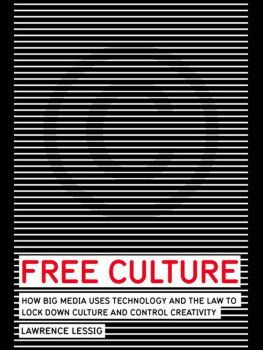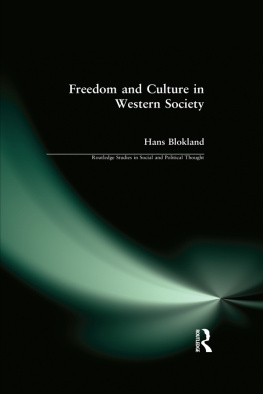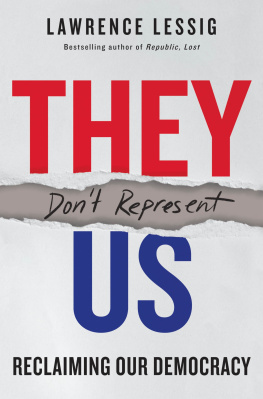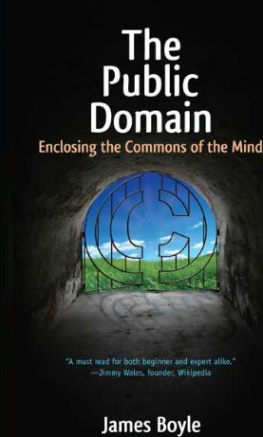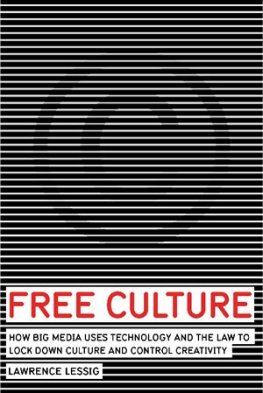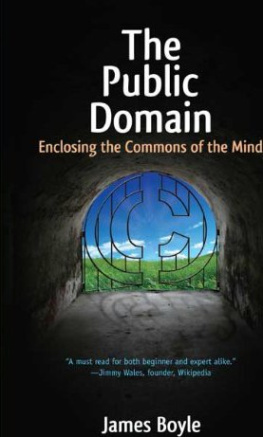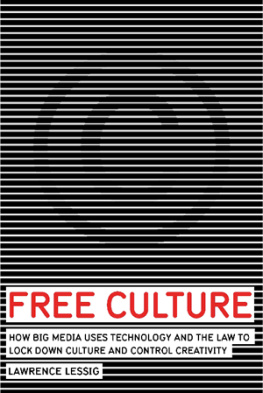THE PENGUIN PRESS
a member of
Penguin Group (USA) Inc.
375 Hudson Street
New York, New York 10014
Copyright Lawrence Lessig, 2004
All rights reserved
Excerpt from an editorial titled The Coming of Copyright Perpetuity, The New York Times, January 16, 2003. Copyright 2003 by The New York Times Co.
Reprinted with permission.
Cartoon by Paul Conrad on page 159. Copyright Tribune Media Services, Inc.
All rights reserved. Reprinted with permission.
Diagram on page 164 courtesy of the office of FCC Commissioner, Michael J. Copps.
Library of Congress Cataloging-in-Publication Data
Lessig, Lawrence.
Free culture : how big media uses technology and the law to lock down culture and control creativity / Lawrence Lessig.
p. cm.
Includes index.
ISBN 978-1-1012-0084-1
Designed by Marysarah Quinn
Without limiting the rights under copyright reserved above, no part of this publication may be reproduced, stored in or introduced into a retrieval system, or transmitted, in any form or by any means (electronic, mechanical, photocopying, recording or otherwise), without the prior written permission of both the copyright owner and the above publisher of this book.
The scanning, uploading, and distribution of this book via the Internet or via any other means without the permission of the publisher is illegal and punishable by law. Please purchase only authorized electronic editions and do not participate in or encourage electronic piracy of copyrighted materials. Your support of the authors rights is appreciated.
Making or distributing electronic copies of this book constitutes copyright infringement and could subject the infringer to criminal and civil liability.
Visit our web site at www.penguinputnam.com
ALSO BY LAWRENCE LESSIG
The Future of Ideas: The Fate of the Commons in a Connected World
Code: And Other Laws of Cyberspace
To Eric Eldredwhose work first drew me to this cause, and for whom it continues still.
At the end of his review of my first book, Code: And Other Laws of Cyberspace, David Pogue, a brilliant writer and author of countless technical and computer-related texts, wrote this:
Unlike actual law, Internet software has no capacity to punish. It doesnt affect people who arent online (and only a tiny minority of the world population is). And if you dont like the Internets system, you can always flip off the modem.
Pogue was skeptical of the core argument of the bookthat software, or code, functioned as a kind of lawand his review suggested the happy thought that if life in cyberspace got bad, we could always drizzle, drazzle, druzzle, drome-like simply flip a switch and be back home. Turn off the modem, unplug the computer, and any troubles that exist in that space wouldnt affect us anymore.
Pogue might have been right in 1999Im skeptical, but maybe. But even if he was right then, the point is not right now: Free Culture is about the troubles the Internet causes even after the modem is turned off. It is an argument about how the battles that now rage regarding life on-line have fundamentally affected people who arent online. There is no switch that will insulate us from the Internets effect.
But unlike Code, the argument here is not much about the Internet itself. It is instead about the consequence of the Internet to a part of our tradition that is much more fundamental, and, as hard as this is for a geek-wanna-be to admit, much more important.
That tradition is the way our culture gets made. As I explain in the pages that follow, we come from a tradition of free culturenot free as in free beer (to borrow a phrase from the founder of the free-software movement ), but free as in free speech, free markets, free trade, free enterprise, free will, and free elections. A free culture supports and protects creators and innovators. It does this directly by granting intellectual property rights. But it does so indirectly by limiting the reach of those rights, to guarantee that follow-on creators and innovators remain as free as possible from the control of the past. A free culture is not a culture without property, just as a free market is not a market in which everything is free. The opposite of a free culture is a permission culturea culture in which creators get to create only with the permission of the powerful, or of creators from the past.
If we understood this change, I believe we would resist it. Not we on the Left or you on the Right, but we who have no stake in the particular industries of culture that defined the twentieth century. Whether you are on the Left or the Right, if you are in this sense disinterested, then the story I tell here will trouble you. For the changes I describe affect values that both sides of our political culture deem fundamental.
We saw a glimpse of this bipartisan outrage in the early summer of 2003. As the FCC considered changes in media ownership rules that would relax limits on media concentration, an extraordinary coalition generated more than 700,000 letters to the FCC opposing the change. As William Safire described marching uncomfortably alongside CodePink Women for Peace and the National Rifle Association, between liberal Olympia Snowe and conservative Ted Stevens, he formulated perhaps most simply just what was at stake: the concentration of power. And as he asked,
Does that sound unconservative? Not to me. The concentration of powerpolitical, corporate, media, culturalshould be anathema to conservatives. The diffusion of power through local control, thereby encouraging individual participation, is the essence of federalism and the greatest expression of democracy.
This idea is an element of the argument of Free Culture, though my focus is not just on the concentration of power produced by concentrations in ownership, but more importantly, if because less visibly, on the concentration of power produced by a radical change in the effective scope of the law. The law is changing; that change is altering the way our culture gets made; that change should worry youwhether or not you care about the Internet, and whether youre on Safires left or on his right.
The inspiration for the title and for much of the argument of this book comes from the work of Richard Stallman and the Free Software Foundation. Indeed, as I reread Stallmans own work, especially the essays in Free Software, Free Society, I realize that all of the theoretical insights I develop here are insights Stallman described decades ago. One could thus well argue that this work is merely derivative.
I accept that criticism, if indeed it is a criticism. The work of a lawyer is always derivative, and I mean to do nothing more in this book than to remind a culture about a tradition that has always been its own. Like Stallman, I defend that tradition on the basis of values. Like Stallman, I believe those are the values of freedom. And like Stallman, I believe those are values of our past that will need to be defended in our future. A free culture has been our past, but it will only be our future if we change the path we are on right now.
Like Stallmans arguments for free software, an argument for free culture stumbles on a confusion that is hard to avoid, and even harder to understand. A free culture is not a culture without property; it is not a culture in which artists dont get paid. A culture without property, or in which creators cant get paid, is anarchy, not freedom. Anarchy is not what I advance here.
Instead, the free culture that I defend in this book is a balance between anarchy and control. A free culture, like a free market, is filled with property. It is filled with rules of property and contract that get enforced by the state. But just as a free market is perverted if its property becomes feudal, so too can a free culture be queered by extremism in the property rights that define it. That is what I fear about our culture today. It is against that extremism that this book is written.

